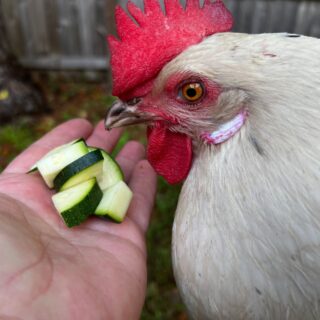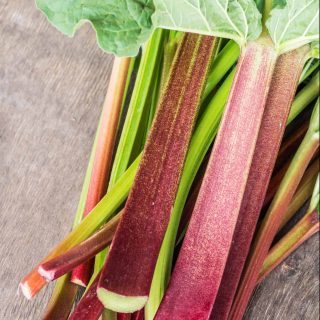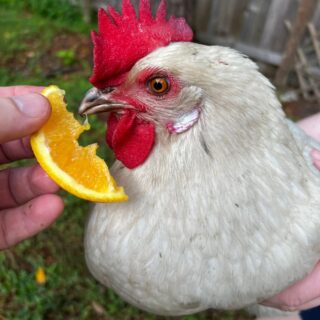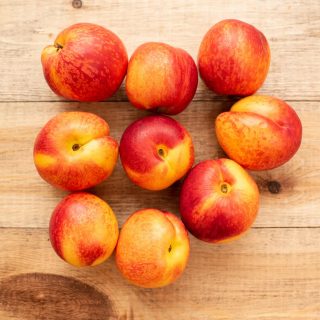Yes, chickens can eat lemons. They can be a safe and healthy snack for your chickens when fed in moderation. Lemons have tons of health benefits (like lots of Vitamin C) and your chickens will love to peck away at them.
Keep reading to get all the tips on how to feed them, what to look out for and more.
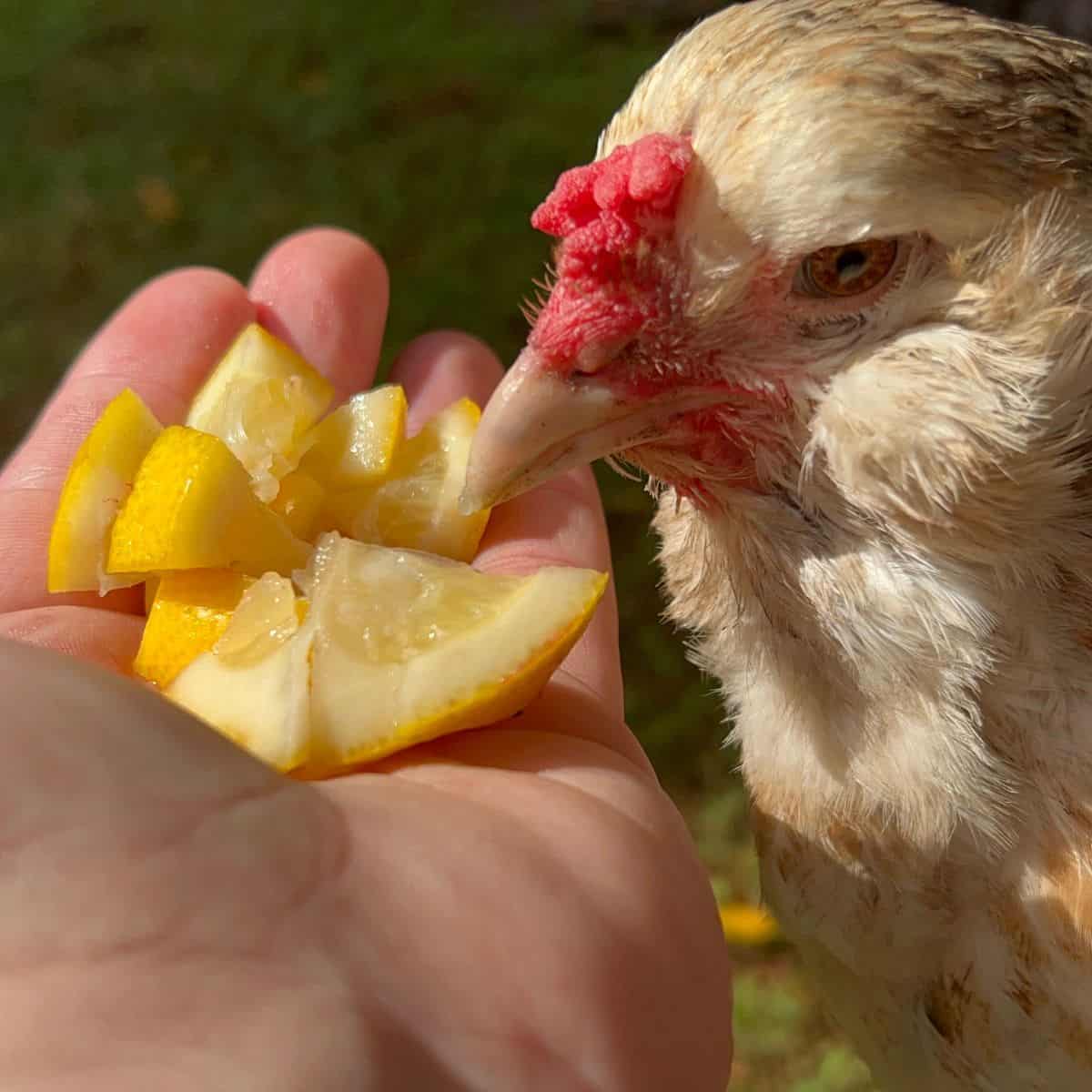
Jump to:
Are Lemons Safe for Chickens?
Yes, lemons are safe for chickens. Despite what you may have heard about citrus fruit being toxic for chickens, there is no evidence that actually says that.
In fact, there are studies of the benefits of citric acid being added to broilers water. As well as the immune benefits of ground lemon peels being fed to chickens.
The truth is, with lemons acidic and sour flavor, some chickens will love them while others will not give them more than a single peck. When we offer some to our flock it's hit or miss for if they like them much.
So, chickens can eat oranges, lemons and other citrus as well even though there has been anecdotal evidence of lethargy, obesity, and excessive preening or loss of feathers.
The truth is, those are all common signs associated when overfeeding (especially sugars). This doesn't just apply to lemons, whether you are feeding chickens peaches, feeding chickens nectarines, feeding chickens cranberries, or feeding chickens raisins, or any other treats you want to feed them in moderation.
If you are feeding your chickens treats, make sure to do routine health checks to keep tabs on your birds.
Need some help keeping your chickens health and care taken care of? Check out the Organized Chicken Keeper for an easy to follow system.
Can chickens eat lemon peels or lemon rinds?
Yes, chickens can eat lemon peels or lemon rinds. They are perfectly fine for your chickens to eat.
They are a bit tough so they likely won't want to eat them, but it is safe for them to do so. We just recommend that you make sure to wash them thoroughly to remove any excess pesticide residue or display wax from the grocery store.
Your chickens may enjoy using lemon peels as a chicken toy and peck at it or scratch it around.
Can chickens eat lemon leaves?
Yep, chickens can eat lemon leaves. If you have lemon trees on your property (or other citrus fruit trees), then your chickens are totally fine to get into them.
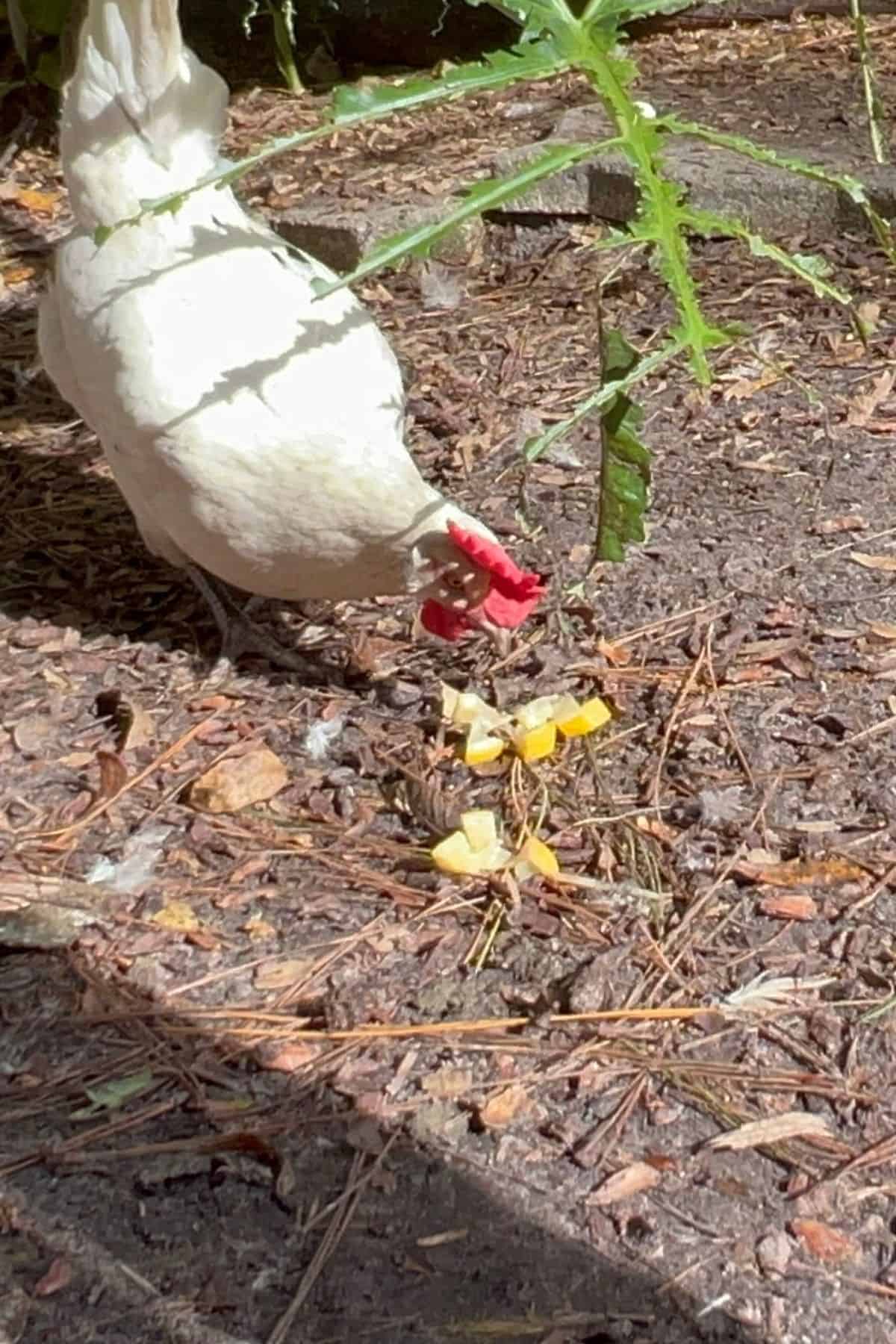
How Do You Feed Chickens Lemons?
- Make sure you have a fresh, not moldy lemon.
- If leaving the peel on, make sure to wash it well.
- If taking the peel off, you can remove it.
- Cut the lemon in half, quarters or slices.
- Seeds are safe, but you can remove them if desired (they can be a choking hazard).
- Toss the lemon out to your chickens to enjoy.
Benefits of Lemons
Lemons are a healthy snack choice for your chickens. Assuming you are feeding lemons sparingly and in moderation, your chickens will enjoy a boost in their immune system from the vitamin C and other antioxidants packed into lemons.
Here are just a few of the vitamins and nutrients and how they support your chickens:
- Vitamin C - keeps a healthy immune system and assists with overall egg laying. For even more vitamin c, chickens can eat kiwi also.
- Potassium - assists with temperature control, electrolytes and hydration.
- B6 - Overall reproduction as well as growth, weight gain and more. If they need even more B vitamins, chickens can eat raspberries as well.
- Calcium - helps to keep egg shells and bones strong.
The table below, courtesy of the USDA FoodData Center, has a breakdown of the nutritional analysis based on a serving size of 1 lemon wedge (8g).
| Name | Amount | Measurement |
|---|---|---|
| Water | 7.1 | g |
| Energy | 2.3 | kcal |
| Protein | 0.1 | g |
| Total lipid (fat) | 0.0 | g |
| Carbohydrate, by difference | 0.7 | g |
| Fiber, total dietary | 0.2 | g |
| Sugars, total including NLEA | 0.2 | g |
| Calcium, Ca | 2.1 | mg |
| Iron, Fe | 0.0 | mg |
| Magnesium, Mg | 0.6 | mg |
| Phosphorus, P | 1.3 | mg |
| Potassium, K | 11.0 | mg |
| Sodium, Na | 0.2 | mg |
| Zinc, Zn | 0.0 | mg |
| Copper, Cu | 0.0 | mg |
| Selenium, Se | 0.0 | µg |
| Vitamin C, total ascorbic acid | 4.2 | mg |
| Folate, total | 0.9 | µg |
| Folic acid | 0.0 | µg |
| Vitamin A, RAE | 0.1 | µg |
| Carotene, beta | 0.2 | µg |
Feeding Chickens Lemons FAQs
No, chickens cannot eat moldy lemons. They should never be offered any moldy or rotten foods.
We recommend only feeding your chicks a quality starter/grower, or other chick-specific feed, until they are old enough to be introduced to the rest of the flock. While they are small chicks they are quickly developing and you do not want to throw off their dietary balance during this time.
If you need more help with taking care of your chickens, check out The Organized Chicken Keeper for a complete system for managing their health through keeping their supplies stocked and coop clean.

